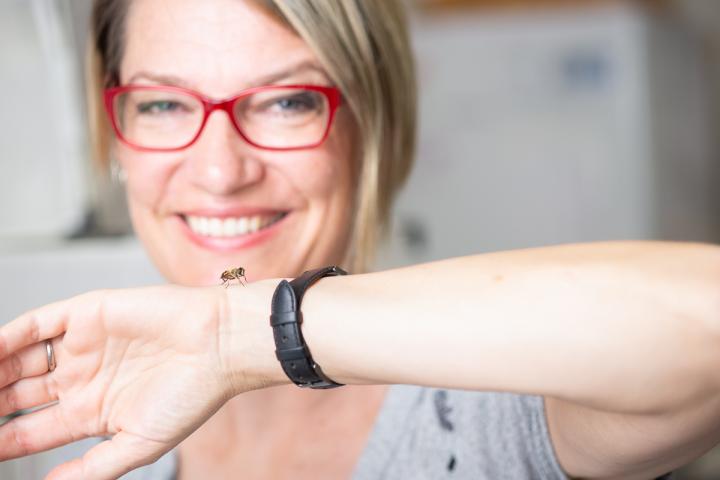Ten times more skilled at ‘life or death’ reactions

Credit: Flinders Foundation, Jonathan Barge photographer
Scientists are homing in on the amazing flying skills of insects. How flying insects are able to respond rapidly and appropriately in a fast-changing surroundings is a serious ambition of new Australian Research Council study.
Led by Flinders University Professor Karin Nordström, and Macquarie University Professor Andrew Barron who will ‘train’ European honeybees, the new ARC project will help unravel how the insects’ movements through the world helps them make rapid decisions.
‘Life or death decisions: making fast, accurate choices in a complex world’ is a $533,000 Discovery Project (DP210100740) that will combine brain recordings with flight analyses and computational modelling to generate new knowledge on how animals may utilise movements to simplify information sampling.
“If you’ve ever tried to swat a fly, you’ll know their response to movement is extremely rapid – about 10 times faster than us,” says ARC Future Fellow Professor Nordström, who leads the hoverfly motion vision research group at Flinders.
“Some insects are so small, but high-performing, we can learn a lot by understanding the neural and behavioural mechanisms that allow them to be very efficient foragers and experts at attacking and evading other insects.”
Findings from this ARC research will inform aspects of autonomous robotics and systems, computational neuroscience, aviation, defence, technologies required for challenging situations such as disaster relief, mining and remote exploration, and even pollination and agricultural applications.
The Flinders University lab has already been surprised by hoverfly responses to target motion, which opens even more questions about how these animals are able to perform optimally, despite carrying small brains and low-resolution compound eyes.
“We know that hoverflies are highly sensitive to movement, so understand how they visualise the world by the way they fly and position their bodies to capitalise on their decision-making will help us understand why they are so efficient at what they do,” says Professor Nordström.
While the Flinders hoverfly lab will investigate the insects’ responses to stimuli on a screen in a confined space, the Macquarie University team led by chief investigator Professor Barron will compare free-flying honeybee flight patterns with a separate group of bees trained to fly to a specific target.
“The ability to train bees, then determining how they fly to a pre-determined target, will allow us to understand whether they adjust their flight path when, for example, a flower is harder to see,” says Professor Baron, ARC Future Fellow at the Macquarie University’s Department of Biological Sciences.
###
References:
Nicholas, S and Nordström, K (2020) Persistent firing and adaptation in optic-flow-sensitive descending neurons Curr Biol 30(14): P2739-2742.E2
Nicholas, S, Leibbrandt, R and Nordström, K (2020) Visual motion sensitivity in descending neurons in the hoverfly J Comp Physiol A 206(2):149-163
Media Contact
Professor Karin Nordström
[email protected]




